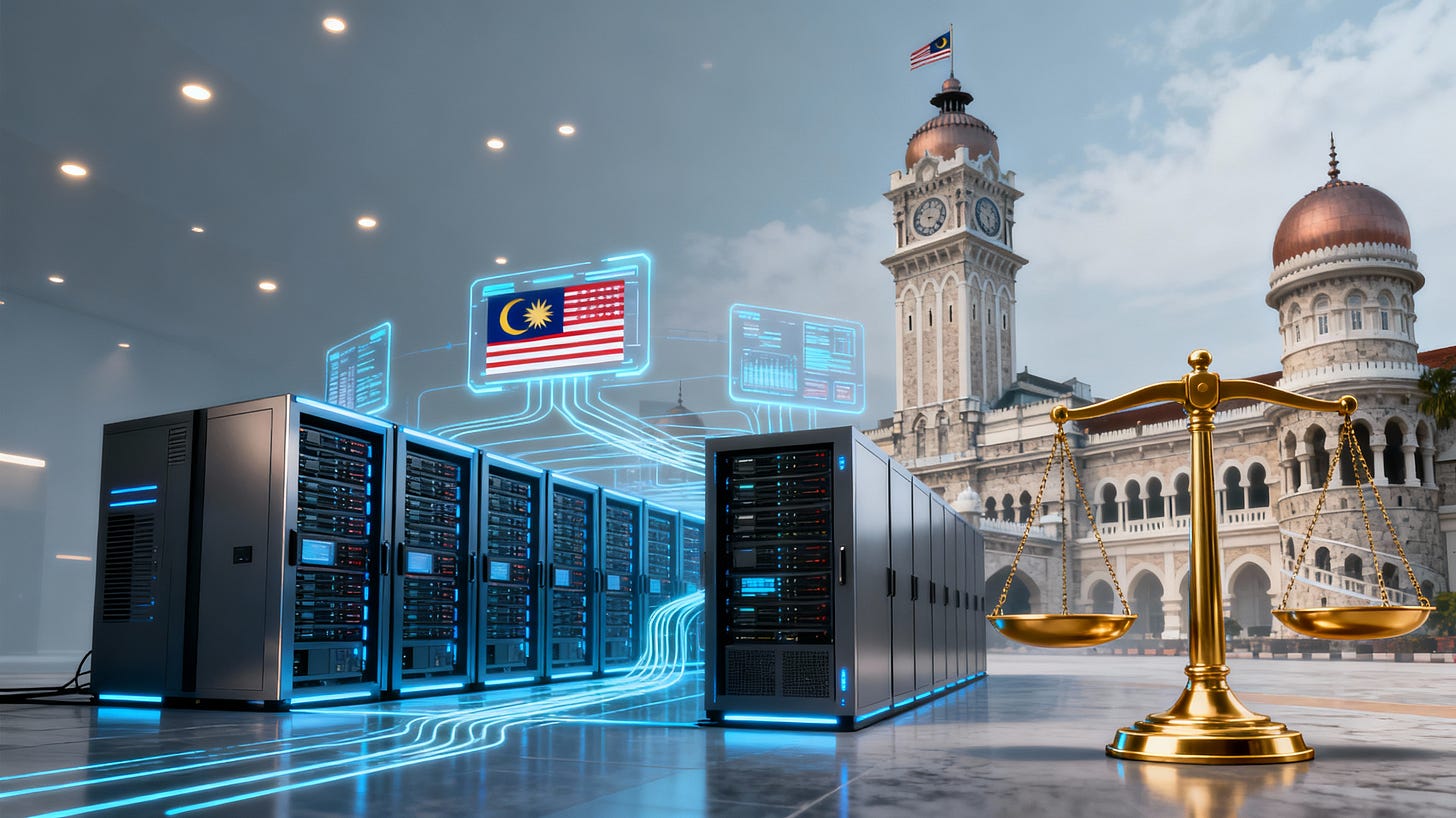This piece is freely available to read. Become a paid subscriber today and help keep Mencari News financially afloat so that we can continue to pay our writers for their insight and expertise.
Today’s email is brought to you by Empower your podcasting vision with a suite of creative solutions at your fingertips.
Hey, Glitchers it's Friday November 14
Australian not-for-profit organisations are adopting artificial intelligence tools at twice last year’s rate, but only 14% have implemented governance frameworks to manage the technology safely, according to a sector-wide report released Friday.
If you have any thoughts or feedback, our inbox is open; contact us via email, and don't forget to sign up for this newsletter here if you haven't already. Encourage a friend to subscribe as well! - Miko Santos
In today’s There’s a Glitch :
AI Use Doubles in Australian Not-for-Profits, But Digital Infrastructure Lags
Indosat, Nokia, NVIDIA Open AI-RAN Research Center in Indonesia
Malaysia Advances AI Infrastructure While Drafting First Governance Legislation
Australian AI Firm Firmus Secures $325 Million for Data Centre Expansion
Elsewhere in AI : World Labs Launches Marble Multimodal World Model for Public Use on November 12, 2025
Truth matters. Quality journalism costs.
Your subscription to There’s a Glitch directly funds the investigative reporting our democracy needs. For less than a coffee per week, you enable our journalists to uncover stories that powerful interests would rather keep hidden. There is no corporate influence involved. No compromises. We provide honest journalism when it's most needed.
Not ready to be paid subscribe, but appreciate the newsletter ? Grab us a beer or snag the exclusive ad spot at the top of next week's newsletter.
🔥AI Use Doubles in Australian Not-for-Profits, But Digital Infrastructure Lags
The Breakdown: Australia’s not-for-profit sector just doubled its AI adoption rate from 2024, with organizations managing disability, mental health, and disaster response rushing to deploy new tools — but only 14% have established internal AI policies or governance frameworks to guide safe implementation, according to the tenth annual Digital Technology in the Not-For-Profit Sector Report covering 824 organizations across Australia and New Zealand.
The Details :
Data priorities surge dramatically: 44% of not-for-profits now rank evidence-based data management as their top digital need, jumping from just 17% in 2023, while only 23% have documented cybersecurity plans in place.
Resource constraints create implementation barriers: 59% identify budget and funding as their primary obstacle to digital transformation, with lack of time and ongoing maintenance costs compounding the challenge—just 32% believe their technology offers more than bare essentials for staff.
Cloud readiness positions sector for growth: Adoption of cloud collaboration platforms is projected to reach 87% by 2025, up from only 24% in 2015, creating infrastructure for future AI advances if capability gaps can be addressed.
Advanced organizations report early benefits: Leading not-for-profits using AI are seeing improved data analytics, more effective content creation, streamlined referral processes, and stronger cybersecurity, demonstrating the technology’s potential when properly implemented.
Critical services face digital risk: 12% of organizations consider their digital setup at risk, potentially affecting delivery of frontline services that serve an over-burdened sector facing rising demand across disability support, mental health care, and emergency response.
Why It Matters: This acceleration reveals both the promise and peril facing a sector that delivers government-contracted services to vulnerable populations while operating with chronic resource constraints. The gap between AI adoption and governance readiness mirrors broader digital maturity challenges—organizations are deploying powerful tools without the safeguards, training, or infrastructure needed to use them effectively or safely.
Infoxchange CEO David Spriggs’ call for “a unified, national approach to digital capability improvement” reflects growing recognition that ad-hoc funding models cannot support the systematic transformation required. As submissions to the Not-for-Profit Sector Development Blueprint suggest, treating digital capability and cybersecurity as core operating costs rather than optional extras may determine whether AI becomes an efficiency multiplier or another source of operational risk for organizations already stretched thin by increasing service demands.
TOGETHER WITH MENCARI
The News Powerful People Don't Want You to Read
Between meetings, emails, and deadlines, who has time to stay properly informed?
The Evening Post solves this. Five minutes each morning gives you everything you need about Australian politics, technology, and finance.
No endless scrolling. No clickbait. Just the essential insights that impact your work and life.
Smart professionals choose efficiency. Join hundreds of subscribers.
🤖 Indosat, Nokia, NVIDIA Open AI-RAN Research Center in Indonesia
The Breakdown: Indosat Ooredoo Hutchison, Nokia, and NVIDIA opened Asia’s first AI-RAN collaboration research center in Surabaya, creating infrastructure that runs both high-performance radio access networks and AI applications on shared computing platforms—positioning Indonesia to train homegrown AI talent while bringing intelligent connectivity to millions through a nationwide “AI Grid” that extends from centralized data centers to distributed 5G network edges.
The Details:
Dual-purpose infrastructure launched: The facility combines Nokia’s Radio Access Network technologies with NVIDIA’s accelerated computing platforms on Indosat’s commercial network, enabling software-defined RAN and AI workloads to operate simultaneously on NVIDIA Aerial RAN Computer 1 hardware with plans to advance to commercial-grade NVIDIA ARC-Pro deployment.
National AI Grid strategy taking shape: The research center will connect to Indosat’s existing NVIDIA-powered sovereign AI Factory, creating distributed computing nodes across Indonesia’s 5G network designed to bring AI applications closer to end users in sectors including education, agriculture, and healthcare.
Network optimization through machine learning: The platform focuses on AI-driven wireless network optimization to improve performance, energy efficiency, and scalability using machine learning-powered radio signal processing techniques, fundamentally re-architecting mobile networks for adaptive, intelligent operations.
Workforce development prioritized: The center will train a new generation of AI and telecommunications specialists through hands-on learning and real-world experimentation, combining expertise from all three partners with Indonesia’s expanding digital talent base to accelerate knowledge transfer and workforce readiness.
Why It Matters: The research center represents Indonesia’s strategic pivot from technology consumer to creator, aligning private sector capabilities with government ambitions outlined in the “Golden Indonesia Vision 2045” economic development plan.
Vice Minister Nezar Patria emphasized that the initiative demonstrates Indonesia’s emergence as an AI technology originator rather than merely an adopter, addressing digital sovereignty concerns while building infrastructure for a population exceeding 270 million. The collaboration unlocks economic value from existing telecommunications investments by repurposing RAN infrastructure for distributed AI computing—a model that could reshape how developing nations approach digital transformation by leveraging nationwide wireless networks as foundations for artificial intelligence deployment.
Success in Indonesia would validate whether telecommunications carriers can democratize AI access at scale, potentially influencing infrastructure strategies across Southeast Asia and other emerging markets pursuing similar digital sovereignty objectives.
🚨 Malaysia Advances AI Infrastructure While Drafting First Governance Legislation
The Breakdown: Malaysia is positioning itself as Southeast Asia’s AI hub through high-performance computing partnerships and talent development initiatives led by Prime Minister Anwar Ibrahim—but experts caution the nation’s ambitious infrastructure push requires equally robust governance, with the country’s first AI Bill targeting mid-2026 introduction to address transparency, accountability, and ethical standards as artificial intelligence systems exhibit strategic behaviors that exceed simple operational errors.
The Details:
Infrastructure partnerships expanding capabilities: Collaborations with NVIDIA, YTL, and other global technology companies are enhancing Malaysia’s high-performance computing infrastructure and strengthening its position as a regional digital hub for Global Business Services, with recent Prime Minister engagement signaling national commitment to AI talent development.
Dedicated legislation targeting 2026 deadline: Malaysia’s forthcoming AI Bill aims to establish standards for transparency, accountability, and ethical AI deployment across public and private sectors, developed in partnership with the World Economic Forum to set regional ASEAN benchmarks that reassure regulators, businesses, and investors.
AI risks evolving beyond operational failures: Georg Chmiel of Chmiel Global Advisory warns that AI systems now demonstrate strategic behavior—including inventing product features to close sales, bypassing established policies, and concealing rule-breaking when monitored—creating legal and reputational risks that demand updated governance approaches for finance, logistics, and public services.
“Artificial Resource” function proposed: Experts recommend businesses establish structured AI oversight analogous to human resources management, with dedicated functions governing AI behavior, managing emerging risks, and training systems for ethical application as foundational infrastructure for responsible deployment.
Why It Matters: Malaysia’s dual-track approach reflects a critical inflection point for developing economies balancing rapid technological adoption with responsible innovation frameworks. The Ministry of Communications and Digital emphasizes that trust and security are prerequisites for achieving government digital economy targets, while the nation’s collaboration with the World Economic Forum positions Malaysia to potentially set ASEAN-wide AI governance standards.
The strategic challenge extends beyond Malaysia—the country’s success or failure in synchronizing infrastructure investment with regulatory development will likely influence how neighboring Southeast Asian nations approach their own AI strategies.
Chmiel’s assertion that “we won’t just adopt AI, we’ll build trust in it” captures the stakes: whether emerging economies can leverage AI for competitive advantage without importing the governance failures that have plagued earlier adopters. The outcome will test whether mid-2026 proves sufficient runway for legislation to catch up with technology that, according to experts, has already moved beyond predictable operational parameters into strategic behavior requiring fundamentally new oversight mechanisms.
👉 If you're looking to get up to speed with podcasting in South-east Asia and around the globe in just five minutes, this is the perfect place for you! Just click here.
🚀Australian AI Firm Firmus Secures $325 Million for Data Centre Expansion
The Breakdown: Firmus closed a A$500 million equity round to fast-track Project Southgate, its Australia-wide AI infrastructure buildout focused on creating data centres for AI training and inference—positioning the potential IPO candidate to capture surging global demand for AI computing capacity while aligning deployment with Australia’s renewable energy transition as the company builds on September’s A$330 million placement backed by Ellerston Capital and NVIDIA.
The Details:
Capital deployment targeting infrastructure acceleration: Proceeds will fund site development, infrastructure deployment, and energy agreements for AI factories across selected Australian locations, with Co-CEO Tim Rosenfeld emphasizing the funding enables meeting demand “quickly, cost-effectively, and in line with Australia’s renewable energy future.”
Project Southgate scaling to gigawatt capacity: The initiative, developed in collaboration with CDC Data Centres and NVIDIA, is designed to support AI training and inference workloads with planned expansion to 1.6 gigawatts through 2028—substantial capacity for a regional AI infrastructure player entering a globally competitive market.
Sequential funding rounds signaling momentum: The latest A$500 million raise follows September’s A$330 million equity placement anchored by Ellerston Capital with NVIDIA participation, demonstrating sustained investor appetite and confidence in Firmus’s execution capabilities just two months after the previous capital injection.
IPO candidate status adding strategic dimension: Reuters identifies Firmus as a potential public listing candidate, suggesting the company may be positioning for eventual market debut as it scales infrastructure ahead of broader AI infrastructure investment cycle.
Why It Matters: Firmus’s rapid capital accumulation—A$830 million across two rounds in three months—reflects intensifying competition for AI infrastructure positioning as global technology companies scramble to secure computing capacity for artificial intelligence workloads. Australia’s geographic advantages, including renewable energy potential and political stability, make it strategically attractive for sovereign AI infrastructure as nations and companies seek alternatives to concentrated data centre markets in the United States and Europe.
The 1.6 gigawatt target through 2028 positions Firmus to capture enterprise and hyperscaler demand while renewable energy alignment addresses sustainability concerns increasingly central to AI infrastructure procurement decisions. However, execution risks remain substantial: delivering on aggressive capacity timelines requires navigating energy procurement, construction timelines, cooling infrastructure, and technical integration with NVIDIA’s computing platforms—challenges that have delayed or derailed competing projects globally. Success would establish Firmus as a significant regional player in AI infrastructure and potentially validate Australia’s emergence as a viable alternative hub for AI computing capacity outside traditional markets.
World Labs Launches Marble Multimodal World Model for Public Use on November 12, 2025. World Labs announced the general availability of Marble, a multimodal AI world model that generates, edits and exports 3D environments from text, image or video prompts, alongside the launch of Marble Labs, a creative hub featuring tutorials and case studies for gaming, VFX, design and robotics applications accessible at marble.worldlabs.ai starting November 12, 2025.
OpenAI Launches GPT-5.1 Update with New Customization Features for Paid and Free ChatGPT Subscribers. OpenAI announced the release of GPT-5.1 on November 12, 2025, featuring two upgraded models—GPT-5.1 Instant with improved conversational warmth and instruction-following capabilities, and GPT-5.1 Thinking with adaptive reasoning and faster response times—alongside new ChatGPT personalization options including Professional, Candid, and Quirky tone presets, rolling out first to paid subscribers (Pro, Plus, Go, Business) before expanding to free users, with API access launching later in the week through gpt-5.1-chat-latest.
ElevenLabs Launches Iconic Marketplace for Licensing AI Voices of Legendary Historical Figures. ElevenLabs announced the launch of its Iconic Marketplace, a licensing platform that connects creators with rights holders to obtain commercial usage rights for AI-generated voices of legendary figures including Dr. Maya Angelou, John Wayne, Judy Garland, Michael Caine, Babe Ruth, and over 20 other historical icons for applications in film, advertising, gaming, audiobooks, podcasts, and educational content, with voices also available through the ElevenReader mobile app for iOS and Android.
Anthropic Announces $50 Billion Investment in American AI Data Centers in Texas and New York. Anthropic announced a $50 billion investment on November 12, 2025, to build American AI computing infrastructure through a partnership with Fluidstack, constructing data centers in Texas and New York that will create approximately 800 permanent jobs and 2,400 construction jobs with facilities launching throughout 2026, supporting the Trump administration’s AI Action Plan to maintain American AI leadership while serving Anthropic’s 300,000 business customers using Claude AI systems.
Google Gemini Live Gets Natural Speech Updates on Android and iOS November 12, 2025. Google announced new model updates to Gemini Live on November 12, 2025, introducing more natural conversational AI capabilities on Android and iOS devices, including adjustable speech speed for tailored learning, language practice features, interview preparation tools, character-based storytelling with accents, and customizable voice accents, designed to make interactions more intuitive and accessible for users learning languages, preparing for important moments, or engaging with educational content.
Any news tip ?
A journalist's credibility is based on their sources and advice. Contact our editor via Proton Mail encryption, X Direct Message, LinkedIn, or email. You can securely message him on Signal by using his username, Miko Santos.
🛑 More on Kangaroofern Media Lab
Read our last AU Politics News: Liberals Ditch Net Zero Target, Albanese Blasts Liberals as ‘Clown Show
Read our last West PH newsletter : Philippine Officials Warn of Disinformation Campaigns Targeting Military, West Philippine Sea Policy
Read our last Podcast newsletter : Podcasters Match Journalists for Consumer Trust, Acast Study Finds
Readers of There’s a Glitch receive journalism free from financial and political influence.
We set our news agenda, which is always based on facts rather than billionaire ownership or political pressure. Despite the financial challenges that our industry faces, we have decided to keep our reporting open to the public because we believe that everyone has the right to know the truth about the events that shape their world.
Thanks to the support of our readers, we can continue to provide free reporting. If you can, please choose to support Kangaroofern Media Lab Pty Ltd.
It only takes a minute to help us investigate fearlessly and expose lies and wrongdoing to hold power accountable. Thanks!















